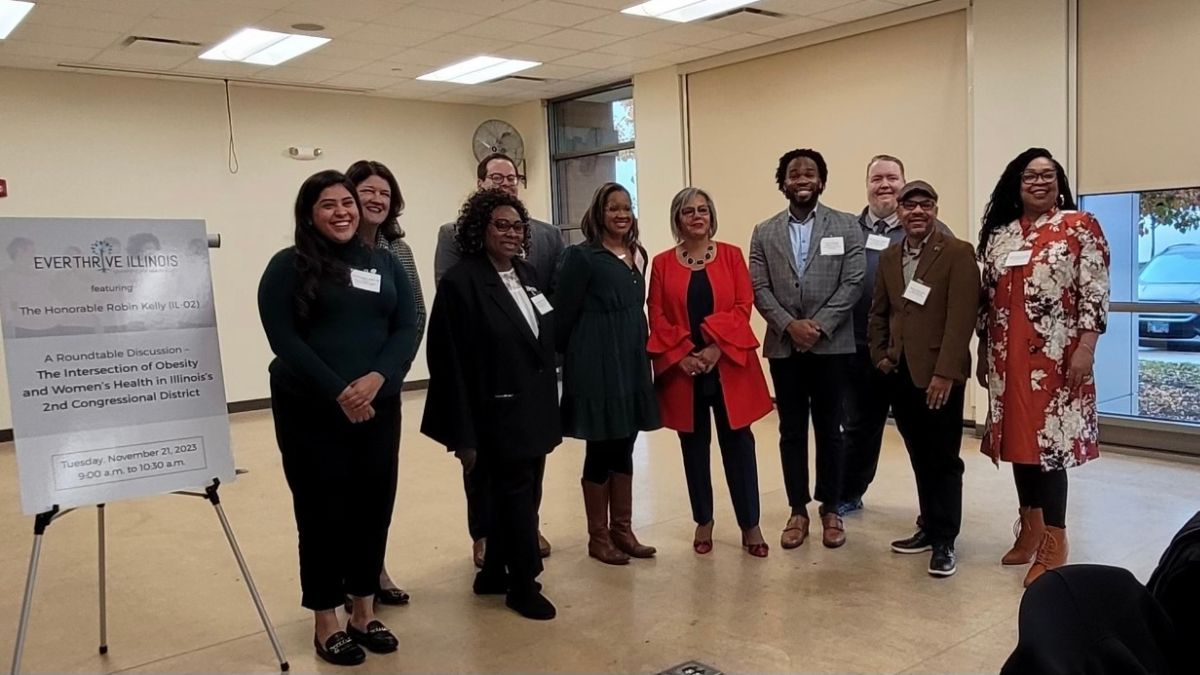Photo: Left to right: Veronica Johnson, MD, Assistant Professor of General Internal Medicine, Northwestern University Feinberg School of Medicine, Tamela Milan-Alexander, Director of Community Engagement, EverThrive Illinois, Congresswoman Robin Kelly, U.S. House of Representatives, Second District of Illinois, Sheila Chalmers-Currin – President, Village of Matteson, Justin Ryder – Associate Professor of Surgery and Pediatrics, Northwestern Feinberg School of Medicine, Lurie Children’s Hospital (Photo Provided).
On Tuesday, U.S. Rep. Robin Kelly (D-IL-2) joined EverThrive Illinois at a roundtable event focused on the intersection of obesity and women’s health care. This is an important topic given that more than 43% of women in Illinois live with obesity.
“Healthy communities are strong communities. I am proud to lead efforts in Congress to reduce the negative health impacts of obesity and expand opportunities for women to access critical care. I am honored to take part in this discussion on obesity and women’s health to create a healthier, more equitable future for the women of Illinois and across the country. We must uplift community-centered solutions and embrace the diverse needs of Black and Brown women and their families. I thank EverThrive Illinois for convening this important discussion,” said Congresswoman Robin Kelly, (D-IL-02).
“EverThrive Illinois is thrilled to convene this roundtable with Congresswoman Robin Kelly (D-IL-2). Creating spaces like this is an important part of our work, and we are excited to welcome health care professionals, community leaders, and elected officials to this event. We are honored to partner together and engage in this discussion around the intersection of obesity and women’s health and how we address the impact on Black and Brown families in Illinois. We are committed to working together so all Illinois communities can thrive,” said Chi Chi Okwu, EverThrive Illinois Executive Director.
Obesity has been classified as a deadly chronic disease since 2013 and is associated with more than 200 serious health conditions, such as cardiovascular disease, diabetes, and some forms of cancer. Unfortunately, there is still an outdated and dangerous view that obesity is simply an issue of individual behaviors.
The reality is that healthy eating and exercise are not always enough, and like many complex diseases, obesity requires a range of treatments and solutions. Women, in particular, face unique risks and challenges when it comes to obesity, whether due to the healthcare system frequently overlooking women’s health or stigma related to weight.
Cardiovascular disease and cancer, two of obesity’s associated conditions, have been the two leading causes of death among women in Suburban Cook County and the city of Chicago.
In general, severe obesity impacts more women than men across the U.S. In Illinois, 25% of women are living with a BMI of 35 plus, compared to 18% of men.
In addition, obesity has a disproportionate impact on women in communities of color: 48% of Hispanic or Latina women and 53% of Black women in Illinois currently live with obesity, compared to 43% of all women in the state. Gaps in health care training and misinformation are preventing us from taking meaningful action to stem this epidemic.




